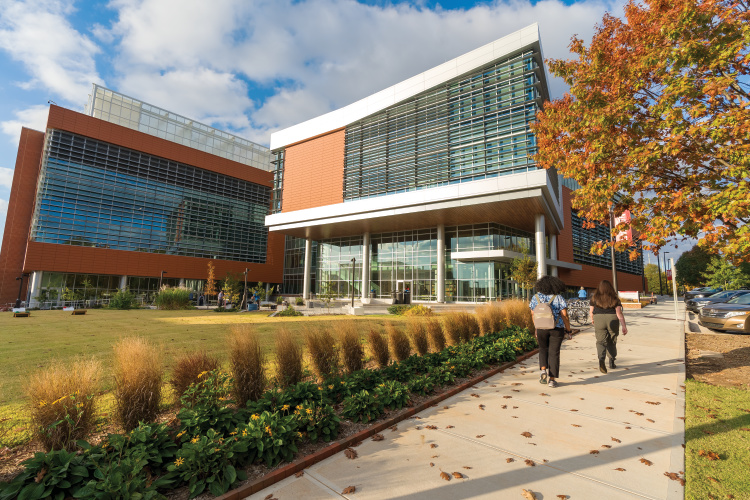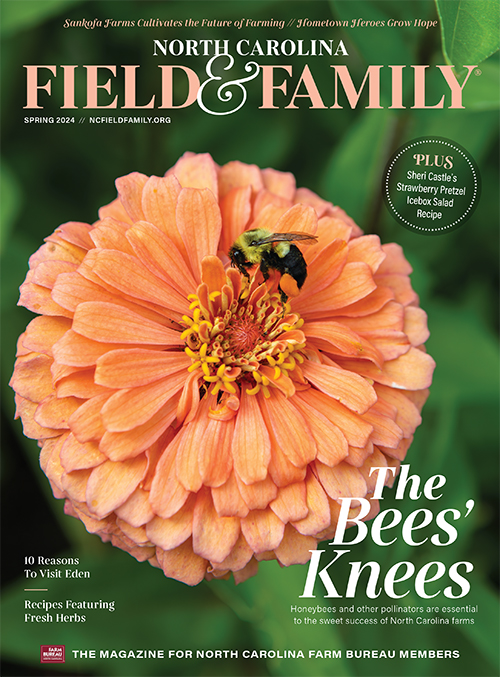New NC State Plant Sciences Building Provides Infrastructure for Ag Research
NC State has a new space where researchers can gather, collaborate and share ideas to enhance North Carolina agriculture.
Rachel Akers |
North Carolina State University is known as a powerhouse institution for agricultural research. By asking challenging questions and searching for answers, researchers aim to make the state’s industry more efficient, profitable and sustainable. Now, with a brand-new Plant Sciences Building (PSB) equipped with cutting-edge technology, the university has a space where researchers from across disciplines can gather, collaborate and share ideas to enhance North Carolina agriculture.
From the Lab to the Field
The 185,000-square-foot building supports the university’s N.C. Plant Sciences Initiative (PSI), which delivers solutions to farmers through interdisciplinary research, student training and effective outreach. Now, faculty and students from various NC State departments and disciplines – for example, plant biology, engineering, crop and soil sciences, and forestry – come together for a research project focused on providing agricultural solutions in the state.
“If you look at the diversity of expertise represented by the faculty in this initiative, we have a very wide breadth coming to the table who may not have previously worked in agriculture,” says Dr. Rachel Vann, assistant professor and Extension soybean specialist. “That’s really the whole spirit of the PSI.”
See more: How NC State Advances Food Manufacturing
Vann came to NC State for grad school and started as a professor and soybean Extension specialist in 2018. About a year ago, she took on a part-time administrative role as the PSI director for Extension Outreach and Engagement.

“In my new position, I’m really focused on the effective, bilateral communication between the end user – the farmer – and the researchers all along the project pipeline,” Vann says. “We look to our robust N.C. Extension system and the farmers to communicate problems in the field, which drive the research projects we do. But we’re also effectively communicating to them the science that’s going on within PSI.”
The theme of collaboration is the backbone of PSI within many areas, including amongst researchers, and between researchers, Cooperative Extension and producers.
New Building, Same Mission
Dr. Cranos Williams, PSI’s platform director for Data-Driven Plant Sciences and the Goodnight Distinguished Professor of Agricultural Analytics in the electrical and computer engineering department, agrees that the interdisciplinary aspect of the PSI opens the door for research acceleration and tailored solutions for farmers. He adds that the new building falls into that mission as well.
See more: Julius Tillery of The Conservation Fund Plants Crops and Ideas
“The mission of PSI is to accelerate translational plant sciences research,” he says. “To be able to do that, you need to have a physical environment where individuals from diverse disciplines and departments can congregate, share ideas and formulate projects. It’s one thing to say you want to do it, but it’s another thing to take action, the way NC State has. We’re fortunate to have so many different disciplines in one building.”

Collaboration Station NC State Plant Sciences Building
The $160.2 million PSB includes 80,000 square feet of research labs, several greenhouses, labs, shared conference space and more. Williams says one of his favorite features is the PSI Makerspace, which was built specifically for agricultural research.
“There are several makerspaces across campus, but this one has specific equipment that will allow for rapid prototyping of low-cost custom hardware and software solutions for monitoring plant and cropping systems from the lab to the greenhouse to the field,” Williams says.
See more: How North Carolina-Based Cotton Incorporated Helps the Cotton Industry Thrive
Williams is using that data acquisition in one of his own research projects that provides better insight for farmers by collecting data on sweetpotatoes across the value chain.

“We’re really focused on capturing the diversity in size and shape of sweetpotatoes,” he says. “All sweetpotatoes don’t have the same level of profit for the farmer. Sometimes, small or misshapen sweetpotatoes won’t sell. If we can understand the nature of their inventory as well as the potential factors that influence shape and size, we can help farmers plan and build for the future. They can be better informed to make management decisions and maximize value.”
Better Research Leads to Better Outcomes
This is just one of several N.C. PSI projects utilizing the PSB. Both Vann and Williams agree that the addition of the building to PSI’s interdisciplinary model sets up a bright future.
“Before, we were traveling back and forth between campuses and it was difficult for people to collaborate with other research groups,” Williams says. “It’s much easier now and people can sit next to their counterparts in other departments and explore ideas. It really accelerates the work. From my perspective, these types of interactions will always translate to better research and outcomes.”
For more about the PSI and PSB, visit cals.ncsu.edu/psi.
– Rachel Stroop



